Exercises(unit2 Book1)
致用英语综合教程unit2[精品]
![致用英语综合教程unit2[精品]](https://img.taocdn.com/s3/m/577792074531b90d6c85ec3a87c24028915f85d5.png)
Unit 2 Knowing our bodyTeaching objectivesAfter learning this unit, Ss will learn how to✧Describe the body parts✧Talk about the functions of the body parts✧Use comparatives and superlatives✧Use the body languageTeaching focusGrammar: comparatives and superlativesV ocabulary building: Name of body parts; base adjectives and strong adjectivesImportant words and phrases: attempt, wonder, sight, blind, stump,quest,couple, smart, hurt, shock, confusion, lesson, reply, selfish, sympatheticTeaching difficulties1. Understanding the structure and main idea of the text.2. Grammar: comparatives and superlativesTeaching ProceduresI. Warming-up questions:What knowledge of human body do you get from the documentary film? Which parts of human body does the documentary mention? (Y ou can skim through new words before l i steni ng.)II. Listening and speaking (1 period)a.This is a lead-in to the listening part. Before playing the recording, askstudents to read the questions. Then play the recording and encounrage students to take notes while listening.anize a speaking activity based on the listening material. First ask Ss toform groups and have a discusssion about which is the mose imortant bosy part. Then ask Ss to role-paly the dialogue in the listening part. Remind them they may use their own language.III. Reading 4 periods1.Pre-reading tasks:Before you read, discuss the foll owi ng questi ons i n groups:a. Has any part of your body ever been injured? If yes, what inconveniences did it cause?Work in groups and share your experiences.b. Have you ever read or heard stories about body parts?2.Reading comprehensiona.Ask Ss to read the text first and then answer the questions in Comprehension Check.b.In this sextion,you may organize a class discussion based on the article students have just studied. This discussion activity is necessary for language learners. They should be able to and present their own experiences after they have received the input information.3.Detailed learning of the textLanguage points※attemptn. an act of trying to do something, especially something difficulte.g. She passed her driving test at the first attempt.v. to try to do something, especially something difficulte.g. He attempted to open the door.He attempted to lie.※stump v.1)if you are stumped by a question or problem, you are unable to find an answer to ite.g. The doctors were stumped and had to call in a specialist.The police were stumped about the motivebehind the murder.(警方给难住了,无法查明这次谋杀的动机。
大学新视野英语第一册读写教程答案Unit 2 the exercises (1)

Unit 2 keys to the exercisesSection AWords in use3.1.awaits2.efficiency3.donation4.polished5. stuffed6. historical7. emotional8. embarrassed9. dump 10.curb Word building4Words learned new words formed-eremploy employercomputer computeinterpreter interpret-icatom atomicartist artisticeconomy economichistory historicelectronic electron-ousenvy enviouscontinue continuousfamous famevarious vary5.1 interpreted2 employer 3artistic 4 historic 5 compute 6 continuous7 economic 8 fame 9 electron 10 atomic 11 envious 12 varyBanked cloze61G 2K 3L 4O 5A 6D 7E 8F 9B 10JExpressions in use71 made it2 After all3 strip off4 with open arms5 throw away6 straighten up7 keep back8 free of/ from Translation10圣诞节是一个被广泛庆祝的文化节日,全世界有许许多多的人在12月25日庆祝这一节日。
它是为了纪念耶稣基督的诞辰。
该节日最早可追溯到公元336年。
渐渐地,这一节日演变为一个既是宗教又是非宗教的节日,越来越多的非基督教徒也庆祝圣诞节。
如今,圣诞节在全球被作为一个重大的节日和公共假日来庆祝。
新通用大学英语综合教程2(第2册)U1课后答案及课件
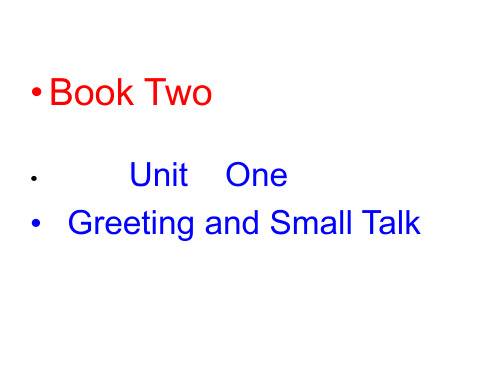
□□
2. Marie has never gone snorkeling in Australia □ □
3. Ms. Novak met Marie in Paris.
□□
4. Marie moved from Paris three years ago. □ □
5. Katerina is Ms. Novak’s sister.
Marie: No. Ms. Novak: Have you ever gone 3___s_n_o_rk_e_l_in_g_____ in Australia?
Marie: No. Ms. Novak: 4__D_r_iv_e_n______ a bus in Peru?
Marie: No. Ms. Novak, I’m quite sure we’ve never met before. I came here only a year ago from Paris.
4. Have they met before?
_______C_h_ic_a_g_o_.______ _H_ig_h__s_c_ho_o_l_(_C_e_n_tr_a_l_H_ig_h). ________Y_e_s_. ________
Comprehension Check
Check whether each statement is true (T) or false (F).
person or thing.
□□
5. Bruneians like to have a firm handshake.
□□
Part 5 Recognition
You will hear a conversation between a man and a woman. The woman thinks she knows the man, so she starts a conversation. Listen to the recording and briefly answer the questions below.
2021届人教新目标初二上英语《Exercises for Unit2》试卷

Exercises for Unit 2一、单项选择( ) 1. –What do you usually do on weekends? –I often go online.A.the, /B. the, theC. /, /( ) 2. do you use the Internet? – Once a week.A.How longB. How oftenC. How many( ) 3. We don’t like him because he helps others.A. alwaysB. neverC. often( ) 4. –You look so tired. Why? I stayed up late. I guess I slept five hours last night.A. at leastB. less thanC. more than( ) 5. He’s interested in sports, basketball, tennis and pingpong.A.for exampleB. such asC. because of( ) 6. –Your bag seems so heavy. –Oh, it’s books.A.afraid ofB. full ofC. a kind of( ) 7. –How many did you finally get in the basketball game?109. But unluckily, we still lost the game.A. pointsB. giftsC. people( ) 8. To everyone’s surprise, the answer this question is very easy.A.ofB. forC. to( ) 9. Jack knows a lot about Chinese his tory he’s only 7 years old.A.butB. becauseC. although( ) 10. Many students spend much time using the Internet . It’s bad for their study.A.for homeworkB. for funC. for study二、根据首字母及句意完成句子1.When my brother is free, he enjoys reading m about sports.2.In my class, only ten p of the students like basketball.3.It rained so hard today. When I got back home, I was a all wet.4.There’s something wrong with my teeth. I think I need to go to the d.5.This math exercise is so hard that n of the students know how to do it.三、用所给词的正确形式填空1.She likes dance very much. Just now, her arms even as she walked.(swing)2.I went to see the dentist for the time yesterday. And I decide to see go there amonth. (one)3.Guo Jingming is a famous . He many books that young people love verymuch. (write)4.My pet cat yesterday. Her makes me very sad. (die)5.of the students in our class like sports. than 30 percent of them likebasketball. (many)四、完形填空We asked thirty children between 14 and 18.All the children had computers at home.The usual time spent on computer in a week was about 12 hours, with the 1 user about 32 hours, and the lowest user only 5 hours.All the children said they usually used computers to 2 . They thought they could have fun by doing this. Fourteen children told us they did some word processing(文字处理)at times.Only two of them said computers helped them 3 their lessons. And eight children told us they 4 addresses and phone numbers on their computers.Only three children said they were learning to make computer programs and 5 looked up databases(数据库) because they thought it was boring.The diagram gives all the 6 one by one.They show that computer use is quite high among 14 to 18yearold children. They also show quite 7 that most young people use computers 8 game machines(机器).It means that, 9 computers are common in the homes of young people, they have not yet become 10 in everyday 1ife.( ) 1. A. tallest B. highest C. biggest( ) 2. A. do exercises B. go camping C. play games( ) 3. A. for B. at C. with( ) 4. A. kept B. read C. bought( ) 5. A. somebody B. nobody C. anybody( ) 6. A. diaries B. things C. results( ) 7. A. slowly B. quickly C. clearly( ) 8. A. as B. to C. in( ) 9. A. but B. and C. although( ) 10. A. popular B. hot C. special五、阅读理并判断正误In China, more and more villagers have left home to make a living in big cities. As a result, their children have become leftover children(留守儿童) and they need more care. The survey below is from some villages in Central China. Three hundred children were chosen to answer the questions.What they want Love Money FreedomControl(支配权)Something else 40% 18% 28% 10% 4%Who to talk with Oneself Family members No one 27% 55% 18%Communication(交流) with their parents freely or not Yes A little difficult No 46% 44% 10%The way they like to live Living with parents Living without parents No idea 58% 14% 28%What they think of their parents’ working in cities Bad Good No idea 20% 39% 41%Happiest place School Home Friend’s home 48% 34% 18%( ) 1. From the chart, we can know that the leftover children need money most. ( ) 2. Most of the children think it’s good to live with their parents.( ) 3. 144 children think their happiest place is their school.( ) 4. During the survey, the children were asked about many things except(除了) their needs.( ) 5. From the survey, we can learn that over 40% of the children have difficulty talking toparents freely.六、完成对话(一空一词)A: Hi, Mark. Long time no see. Where are you going?B: To the gym (健身房).A: How often do you exercise?B: 1. a week, on Friday and Sunday.A: What makes you start exercising?B: You know, I’m too heavy. I need to lose some weight 2. exercise.A: That sounds good. I want to exercise too. But my schedule(时间表)is very 3. . I 4.have no time to exercise.B: Don’t forget that 5. comes first. Without it, you can do nothing well.A: I certainly know its 6. . But do you know my job? I do lots of 7.work every day. I sit in the chair the whole day and use the Internet all the time.B: Well, 8. you’re busy, you can exercise after work.A: Er…When I get back home, I am tired enough. I don’t think I can do anything but rest.B: So, how often do you exercise?A: 9. . I really don’t have any time. When I have time, I just want to sleep.B: Oh, I have to say, when you’re old, many illnesses will come to you. Those are the 10.of not exercising.A: Sounds terrible. I think I need to change a little.七、用所给词的正确形式补全短文。
仁爱版九年级英语上册Unit2Topic1SectionC教学设计

(一)导入新课
1.教学活动设计:教师通过展示一组关于环境问题的图片,如污染、资源浪费等,引发学生对环保话题的关注,激发学生的学习兴趣。
教学语言引导:“Look at these pictures, can you tell me what is happening to our environment? Do you think it is important to protect our environment? Why?”
3.培养学生积极向上的态度,鼓励学生面对困难和挑战时,保持乐观、勇敢面对。
4.借助本章节的学习,引导学生树立正确的人生观、价值观,使学生认识到人与自然的和谐共处的重要性。
二、学情分析ቤተ መጻሕፍቲ ባይዱ
九年级学生已具备一定的英语基础,但在语言运用、思维能力和情感态度方面仍有待提高。在本章节的学习中,他们对于环境问题有一定了解,但可能缺乏深入的认识和关注。在语言技能方面,学生的听、说、读、写能力发展不均衡,部分学生在口语表达和写作方面存在困难。
3.教师总结:教师针对学生的反思和分享进行总结,强调环保意识的重要性,鼓励学生在日常生活中采取行动,保护环境。
教学语言引导:“In conclusion, I hope you can remember what we have learned and apply it to your daily life. Remember that it’s time to take action to protect our environment!”
五、作业布置
为了巩固本章节所学知识,培养学生的实践能力和创新思维,特布置以下作业:
1.写作练习:请运用本节课所学的被动语态和重点词汇,写一篇关于环保的短文,内容可包括环保问题的描述、解决措施及个人观点。要求:80-100词,语言准确,表达清晰。
Exercises(unit3Book1)
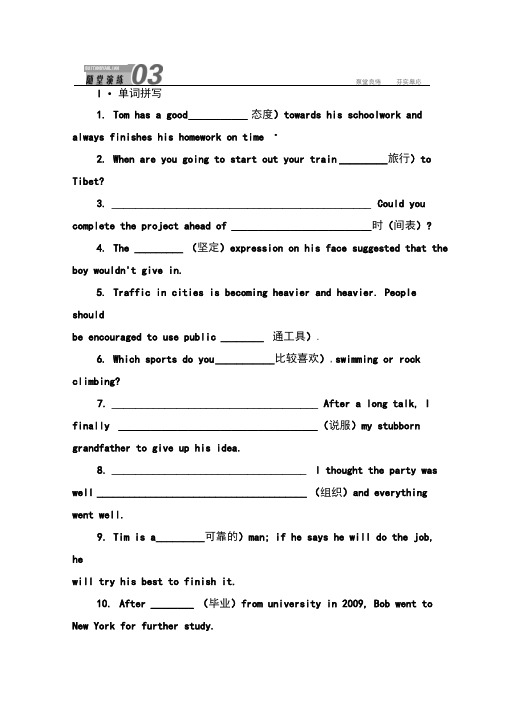
SUITANSYANLIAN泵堂良惓芬实皋応I •单词拼写1.Tom has a good ___________ 态度)towards his schoolwork and always finishes his homework on time ・2.When are you going to start out your train _________ 旅行)to Tibet?3.____________________________________________ Could you complete the project ahead of __________________________ 时(间表)?4.The _________ (坚定)expression on his face suggested that the boy wouldn't give in.5.Traffic in cities is becoming heavier and heavier. People shouldbe encouraged to use public ________ 通工具).6.Which sports do you ___________ 比较喜欢),swimming or rock climbing?7. ___________________________________ After a long talk, I finally _____________________________________ (说服)my stubborn grandfather to give up his idea.8. _________________________________ I thought the party was well _______________________________________ (组织)and everything went well.9.Tim is a _________ 可靠的)man; if he says he will do the job, hewill try his best to finish it.10.After ________ (毕业)from university in 2009, Bob went to New York for further study.泵堂良惓芬实皋応答案1.attitude2.journey3.schedule4.determined5.transport6. prefer7.persuadedanized9.reliable 10. graduatingn .用所给词的适当形式填空1.Mr. Smith, who is a very ___________ person, works as the president of a large international ______ (organize.)2.Li Hua is a young man with great _______ (determine.)3.My brother _______ from Beijing University in 2008. I stillremember the day when we went to his _________________ ceremony(graduate).4.If a person always behaves ________ (proper), he will find iteasy to realize his dream.5.We are looking for someone who is ____________ (rely) andhardworking.6.A teacher should not show __________ (prefer) for any one of hispupils.7 .After the flood, many things have been _________________(transportation) to the flooded area.8.His poor eyesight was a ________ (advantage) to him.9.I _______ (final) passed the test with my teacher's help.10.He is good at ________ (persuade.)答案1.organized; organization 2.determination3.graduated; graduation 4.properly 5.reliable6.preference 7.transported 8.disadvantage9.finally 10.persuasion皿•单句语法填空1.My sister is fond _______ going for a walk after supper.2.Her attitude _______ learning English has changed.3._______ (dress) in a new dress, she looks more beautiful.4.Don't give ________ to difficulties, and you will succeed・5.It was my mother __________ put forward a good solution to the problem.6.How I wish I_________ (can) make up for the lost time.7.We found ourselves ___________ (cycle) through clouds.8.He was about to close the window ___________ a beautiful flower caught his eye.9.Ever since 1990, the Greens __________ (live) a peaceful life in this village.10.She insisted we __________ (keep) pace with society.答案与解析1.of be fond of 喜欢。
新标准大学英语1阅读教程1答案(Unit1-Unit2)
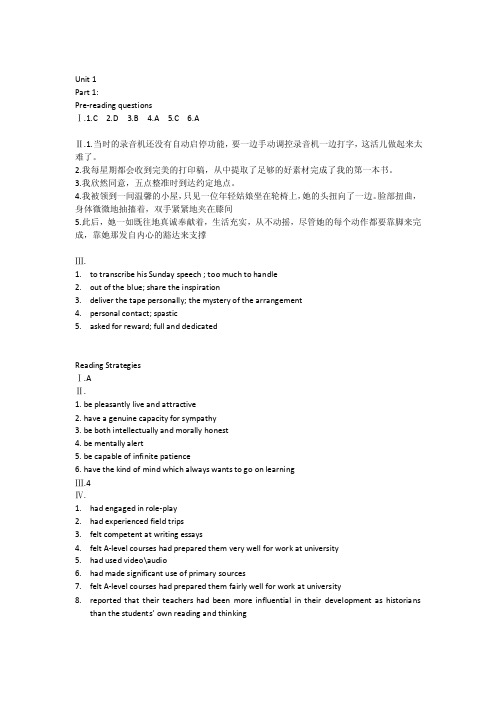
Unit 1Part 1:Pre-reading questionsⅠ.1.C 2.D 3.B 4.A 5.C 6.AⅡ.1.当时的录音机还没有自动启停功能,要一边手动调控录音机一边打字,这活儿做起来太难了。
2.我每星期都会收到完美的打印稿,从中提取了足够的好素材完成了我的第一本书。
3.我欣然同意,五点整准时到达约定地点。
4.我被领到一间温馨的小屋,只见一位年轻姑娘坐在轮椅上,她的头扭向了一边。
脸部扭曲,身体微微地抽搐着,双手紧紧地夹在膝间5.此后,她一如既往地真诚奉献着,生活充实,从不动摇,尽管她的每个动作都要靠脚来完成,靠她那发自内心的豁达来支撑Ⅲ.1.to transcribe his Sunday speech ; too much to handle2.out of the blue; share the inspiration3.deliver the tape personally; the mystery of the arrangement4.personal contact; spastic5.asked for reward; full and dedicatedReading StrategiesⅠ.AⅡ.1. be pleasantly live and attractive2. have a genuine capacity for sympathy3. be both intellectually and morally honest4. be mentally alert5. be capable of infinite patience6. have the kind of mind which always wants to go on learningⅢ.4Ⅳ.1.had engaged in role-play2.had experienced field trips3.felt competent at writing essays4.felt A-level courses had prepared them very well for work at university5.had used video\audio6.had made significant use of primary sources7.felt A-level courses had prepared them fairly well for work at university8.reported that their teachers had been more influential in their development as historiansthan the students’ own reading and thinking1.Despite her blindness, the author’s mother never fails to amaze her children with herknowledge of what is going on around her. For them she seems to know everything2.The moment she touched the dead bird, she screamed and drew back her hand immediately.Then she ordered the author and the bird outside and admonished her never to let her touch such a thing again.3.She was aware of the dog’s presence because she heard its toenails clicking on the bedroomfloor4.She was trying to tell her children that she knew everything about them and loved them, theway every mother knew and loved her children. Besides she wanted to show her children that she was also rearing them with her mind’s eye.5.This is because her mother is great. She shows that a blind person can also have dignity,character, wisdom, as well as a great love and devotion for her family. The author is in fact proud of her motherPart 31. F2.T3. F4. F5.T6. C7. D8. A9. E10.B11.E12.D13.B14.C15.A16.C17.B18.D19.C20.A21.D22.E23.C24.BUnit2PartⅠ:ExercisesⅠ1-6 ADBCACⅡ 1.我当时19岁,是德克萨斯大学的学生,一帆风顺,正在实现我的“梦想”—成为一名整形外科医生。
新视野大学英语第三版读写教程第一册Unit-2教案

Unit 2, Book OneSection A: Loving parents, loving children1. Teaching Objectives:To talk about the love between the parents and childrenTo understand the love between the mother and the daughter in the textTo apply the phrases and patternsTo write an essay creatively based on the understanding of the text2.Time Allotment:Section A (3 periods):1st ---2nd period: Pre -reading activities ( theme -related questions for warming up;)While-reading activities (cultural notes; useful words and expressions;difficult sentences)3rd period: While -reading activities (text structure; main ideas)Post-reading activities (comprehension questions; exercises)Section B(1period):4th periods: Practice of the reading skill (reading for the key idea in a sentence);T checks on Ss’ home reading by asking questions based onthe passage.T explains some difficult sentences3.Teaching Procedures:Pre-reading ActivitiesStep 1. GreetingsGreet the whole class warmly.Step 2. Lead-in and preparation for readingLet them have a surveySurvey: How close are you and your parents?Check ( √ ) the statements which are true for you.I have been missing my parents a lot since I left for college.I often chat with my parents.I like sharing my joys and sorrows with my parents.I always remember my parents’birthdays.I know about my parents’hobbies.My parents allow me to make my own decisions.Ask a question: To what extent are you close to your parents?be like friends;never keep secret from them;ask them for advice;give me directions about lifeStep 3. Fast readingAsk the Students to read the passage as quickly as they can and then answer the questions on the screen. Let them get the main idea of each paragraph and make clear about the text structure.Text structure: ( structured writing ) The passage can be divided into 3 parts.Part1 (para.1-4) Opening part of the welcome speech General situation & my responses.Part 2 (para.5-12) The mess left in my daughter’s bathroom and my responses.Part 3 (Para.13-22) Concluding part: The changes of my attitude.Purpose: Improve the students’reading and writing ability and understand the general idea of each paragraph.Method: Read the text individually and talk in groups; Use task-based language teachingmethod, reading approach, communicative approach and total physical response method.Step 4. Preparation for details of the text on the screenStudents are required to look at the Words and Phrases on the screen and give a brief presentation in class.Words and Phrases:Purpose: Train the Students’ ability of understanding and using foreign language.Method: Talk in groups, Use task-based language teaching method , communicative approach and total physical response method.1.(Para.1) make it. 成功;准时抵达With blood pouring from his leg, he made it to a nearby house.他腿上流着血,支撑着走到邻近的一所房屋。
大学英语综合第一册第二单元答案

9) We had a family [reunion] where I saw relatives I hadn't seen for 20 years.
BOOK 1 - Unit 2 - Language Focus - Vocabulary
10) I guess Henry has been busy writing an article [or ssoommeetthhiningg]] recently. That's why he couldn't accept the invitation.
11) Scientists [estimate] that smoking reduces life expectancy by around 12 years on average.
12) Although it is unlikely that everyone will be able to come, they are still [going ahead] with the plan to hold a class reunion.
3) What was their conversation centered on [Their conversation was centered on the lifelong friendship between the driver and Old Ed.]
新通用大学英语综合教程2(第2册)U1课后答案及课件
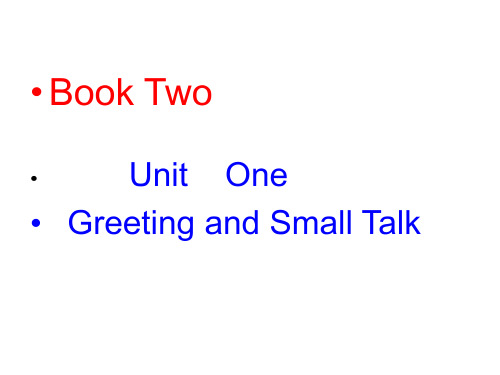
3. Where does the woman think they met?
4. Have they met before?
Comprehension Check
Check whether each statement is true (T) or false (F).
Information
Kate —Thailand —China —Turkey Kathy —Canadian —Korean —Columbian —16 years old —60 years old — 6l years old —English —French —Korean —Spanish —businesswoman —secretary —student —divorced —married —single
Marie: No.
Driven Ms. Novak: 4____________ a bus in Peru? Marie: No. Ms. Novak, I’m quite sure we’ve never met before. I came here only a year ago from Paris.
Have you ever… 1. been to South America? 2. been to China? 3. flown in an airplane? 4. driven a bus? 5. bought a digital camera? 6. visited Chicago? Suzy yes no Bill yes no
firm 2. The government must take __________ action to stop the fighting. indicator 3. Time spent in education is a good __________ of social and economic position.
全新版大学英语综合教程2课后练习答案

全新版大学英语综合教程2课后练习答案Key to Exercises of College English Book 2Unit 1★ Text AVocabularyI.1)To use the machine, first insertthe correct cions,then select the drink you want and button.使用这台机器,首先插入正确的硬币,然后选择你想喝和按钮。
2)Professor Smith translated not only from the French but also,on occasion,from the Polish.史密斯教授翻译不仅从法国也,有时,来自波兰。
3)Food chemists will investigatethe health food on sale to see if it really dose give the benefits claimed.食品化学家将调查在销售保健食品是否真的剂量给人的利益。
4)In retrospect,it was the wrong time to open anew data processing center in this city.回想起来,那是打开新的数据处理中心在这个城市,错误的时间。
5)Myinitialreaction to the news was relief,but as I thoughtmore about itI began to feel angry.听到这个消息我最初的反应是救济,但我想一下我开始感到愤怒。
6)A full understanding of mathematics is sufficient to explain a wide variety of naturalphenomena.一个全对数学的理解是足以解释各种各样的自然现象。
《新编大学英语》第三版第一册-课后翻译练习参考答案

Book 1 Translation ExercisesUnit 1 Translation1)当我知道详细情况时,我意识到我不该在办公室发脾气。
(should not have done)2)我和鲍勃不是很熟,不过我们偶尔一起出去喝一杯。
(occasional)3)会议应该在周二召开,但我们不得不推迟(be supposed to)4)我国政府采取行动使那个国家的所有中国人回到了祖国( take action)5)包括周末在内,仅仅还有12天时间可以用来买圣诞礼物。
(including)6)如果不立即采取行动,许多种野生动物就会因饥饿而死亡。
(without, hunger) 1)When I knew the details, I realized I shouldn’t have lost my tempers inthe office.2)I don’t/didn’t know Bob very well, but we go/went out for anoccasional drink together.3)The meeting is supposed to taken place on Tuesday,but we have to putit off.4)4)Our government took action immediately to bring all the Chinesein that country back to motherland.5)Including weekends, there are only twelve more days to buy Christmaspresents.6)Without immediate action, many kinds of wild animals would die fromhunger.Unit 2 Translation1)那首歌总是使她回想起在芝加哥度过的那个夜晚。
Exercises for Unit 1 and 2(练习+答案)
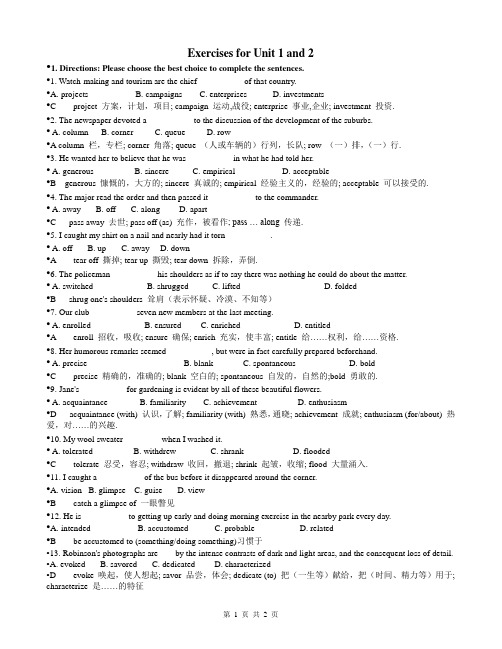
Exercises for Unit 1 and 2•1. Directions: Please choose the best choice to complete the sentences.•1. Watch-making and tourism are the chief __________ of that country.•A. projects B. campaigns C. enterprises D. investments•C project 方案,计划,项目; campaign 运动,战役; enterprise 事业,企业; investment 投资.•2. The newspaper devoted a __________ to the discussion of the development of the suburbs.• A. column B. corner C. queue D. row•A column 栏,专栏; corner 角落; queue (人或车辆的)行列,长队; row (一)排,(一)行.•3. He wanted her to believe that he was __________ in what he had told her.• A. generous B. sincere C. empirical D. acceptable•B generous 慷慨的,大方的; sincere 真诚的; empirical 经验主义的,经验的; acceptable 可以接受的. •4. The major read the order and then passed it __________ to the commander.• A. away B. off C. along D. apart•C pass away 去世; pass off (as) 充作,被看作; pass … along 传递.•5. I caught my shirt on a nail and nearly had it torn __________.• A. off B. up C. away D. down•A tear off 撕掉; tear up 撕毁; tear down 拆除,弄倒.•6. The policeman __________ his shoulders as if to say there was nothing he could do about the matter.• A. switched B. shrugged C. lifted D. folded•B shrug one's shoulders 耸肩(表示怀疑、冷漠、不知等)•7. Our club __________ seven new members at the last meeting.• A. enrolled B. ensured C. enriched D. entitled•A enroll 招收,吸收; ensure 确保; enrich 充实,使丰富; entitle 给……权利,给……资格.•8. Her humorous remarks seemed __________, but were in fact carefully prepared beforehand.• A. precise B. blank C. spontaneous D. bold•C precise 精确的,准确的; blank 空白的; spontaneous 自发的,自然的;bold 勇敢的.•9. Jane's __________ for gardening is evident by all of these beautiful flowers.• A. acquaintance B. familiarity C. achievement D. enthusiasm•D acquaintance (with) 认识,了解; familiarity (with) 熟悉,通晓; achievement 成就; enthusiasm (for/about) 热爱,对……的兴趣.•10. My wool sweater ________ when I washed it.• A. tolerated B. withdrew C. shrank D. flooded•C tolerate 忍受,容忍; withdraw 收回,撤退; shrink 起皱,收缩; flood 大量涌入.•11. I caught a __________ of the bus before it disappeared around the corner.•A. vision B. glimpse C. guise D. view•B catch a glimpse of 一眼瞥见•12. He is __________ to getting up early and doing morning exercise in the nearby park every day.•A. intended B. accustomed C. probable D. related•B be accustomed to (something/doing something)习惯于•13. Robinson's photographs are ___ by the intense contrasts of dark and light areas, and the consequent loss of detail. •A. evoked B. savored C. dedicated D. characterized•D evoke 唤起,使人想起; savor 品尝,体会; dedicate (to) 把(一生等)献给,把(时间、精力等)用于; characterize 是……的特征•14. This __________ sight attracts the camera enthusiasts to Swampland from where excellent photographs of the bridge can be taken.•A. impressive B. delightful C. inspiring D. expressive•A impressive 给人印象深刻的delightful 令人愉快的inspiring 鼓舞人的expressive(有关)表现的,表达的•15. He was rather __________ about the reasons why he never finished school.•A. vivid B. rude C. tough D. vague• D vivid 生动的,栩栩如生的rude 粗鲁无理的tough 粗暴的;困难的;坚强的vague 含糊的,不明确的) •16. It seems I _____ you an apology --- I was supposed to phone you on Saturday night.•A. owe B. earn C. paid D. deserve•A owe 欠earn 赚得,挣得deserve 应受,应得2. Directions: Complete the following sentences with the appropriate form of the words in the brackets.1. The conversation was limited by my (imperfect不完美的)Spanish. (perfect)2. The couple shared a romantic (intimacy亲密(关系))that they decided was love. (intimate)3.I stopped for gas twice during the (lengthy很长的) car trip. (length)4. It is wise to use (grammatical符合语法规则的)sentences in formal situations, such as when interviewing for a job. (grammar)5. And all this praise just because the poor man has died—doesn't it strike you as (insincere不真诚的strike somebody as... 给某人留下某种印象)? (sincere)6. The film has some very powerful (visual视觉的) imagery. (vision)7. People travel for miles to see these (poetic有诗意的) sunsets. (poet)8. She wasn't very (complimentary表示称赞的) about your performance, was she? (compliment)9. You will need (permission允许,许可) from the council to extend your garage. (permit)10. Psychologists have been studying (perception感知(能力),觉察) in rats in an attempt to discover more about human mental process connected with sight. (perceive)11. My calculations were based on the (assumption假设,假定) that house prices would remain steady. (assume)12. He believes that a certain amount of (rebellious反抗的,难控制的,叛逆的) behavior is normal among teenagers. (rebel)13. We have been given (reassurances安慰,安慰的话) that the water is safe to drink. (reassure)14. It is my fondest (expectation期望fond expectation/hope 热切而又不大可能实现的期望或愿望) that all of my children will go to college. (expect)15. My piano playing has improved (significantly) since I have had a new teacher. (significant)16. A jury's decision in a court must be made (objectively). (objective)17. Children's (acquisition) of their native tongue is still a mystery to many linguists. (acquire)18. There is little ________ that the protesters will leave the building peacefully. (indicate)(indication)19. All she was interested in was the ________ of her own career. (advance)(advancement)20. Considering the problems he's had, there can be little ________ of him winning the race. (expect) (expectation)。
实用综合教程(第二版)1-Unit_2__课后答案
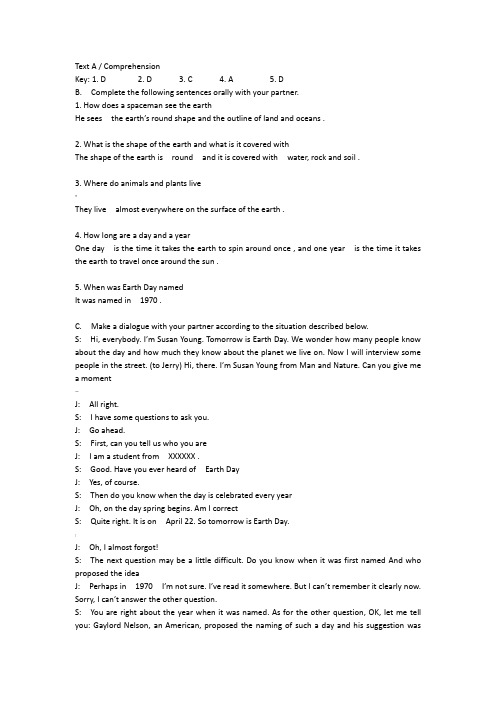
Text A / ComprehensionKey: 1. D 2. D 3. C 4. A 5. DB. Complete the following sentences orally with your partner.1. How does a spaceman see the earthHe sees the earth’s round shape and the outline of land and oceans .2. What is the shape of the earth and what is it covered withThe shape of the earth is round and it is covered with water, rock and soil .3. Where do animals and plants live*They live almost everywhere on the surface of the earth .4. How long are a day and a yearOne day is the time it takes the earth to spin around once , and one year is the time it takes the earth to travel once around the sun .5. When was Earth Day namedIt was named in 1970 .C. Make a dialogue with your partner according to the situation described below.S: Hi, everybody. I’m Susan Young. Tomorrow is Earth Day. We wonder how many people know about the day and how much they know about the planet we live on. Now I will interview some people in the street. (to Jerry) Hi, the re. I’m Susan Young from Man and Nature. Can you give me a moment—J: All right.S: I have some questions to ask you.J: Go ahead.S: First, can you tell us who you areJ: I am a student from XXXXXX .S: Good. Have you ever heard of Earth DayJ: Yes, of course.S: Then do you know when the day is celebrated every yearJ: Oh, on the day spring begins. Am I correctS: Quite right. It is on April 22. So tomorrow is Earth Day.;J: Oh, I almost forgot!S: The next question may be a little difficult. Do you know when it was first named And who proposed the ideaJ: Perhaps in 1970 I’m not sure. I’ve read it somewhere. But I can’t remember it clearly now. Sorry, I can’t answer the other question.S: You are right about the year when it was named. As for the other question, OK, let me tell you: Gaylord Nelson, an American, proposed the naming of such a day and his suggestion waslater accepted by the United Nations. My next question is: why can animals and plants live on the earthJ: They can live on it first because it is just the right distance from the sun . Living things need the sun’s warmth and light for life. They also must have enough water to live. The earth has plenty of water that covers most of its surface .S: The last question: what lies at the center of the earthJ: A ball of hard metal lies at the center of the earth.S: Very good. I think you know a lot about our mother earth. Thank you for your time.J: You are welcome. I’m glad to have taken part in your program. And I lik e your program very much .S: Thank you again! Goodbye!(J: Bye!Vocabulary Building / ExercisesA. Match each word with its proper Chinese meaning.B. Fill in each blank with a given word or expression in their right form.form inclu de at the center of call (one’s) attention toprotect as far as surface measure·1. I’ll help you as far as I can.2. He had included a large number of funny stories in the speech.3. These greenbelts protected / protect / have protected 500,000 acres of farmland against moving sands.4. The TV program is shown to call people’s attention to water pollution in China.5. A soft wind caused ripples on the surface of the lake.6. The children formed / have formed a circle around her.7. My mother measured / has measured / is measuring me for a new dress.8. The park lies at the center of the city.*Grammar Tips / ExercisesA. Fill in each blank with a proper preposition.1. He asked me whether the movie was based on a real story.2. The Beckhams traveled around China in 2011.3. You can look up the word in the dictionary.4. — Where are good potatoes grown—Good potatoes are grown in North China.5. —What’s this bottle made of—It’s made of china.'6. We are busy preparing for the exam.7. A new bridge is built over the river.8. He came into the classroom with a book in his hand.9. There is a lamp between the bed and the desk.10. Autumn is the best season of the year in Beijing.B. Complete each sentence with one of the prepositions given in brackets.1. The two countries are at war. (at / about / with)2. The rain was beating against the windows. (in / against / at)3. The train is ten minutes behind time. (behind / after / before)|4. There are many other people besides Tom at the party. (but / beside /besides)5. Who is he after (after / before / in)6. The policeman caught the thief by the arm. (at / by / with)7. The ball fell to the ground. (to / in / over)8. I am here only on business and I’ll leave soon. (under / on / with)9. There is a map of China on the wall. (for / like / of)10. Ten years passed and his son has grown into a young man. (like / into / to)C. Fill in each blank according to the Chinese given in brackets.1. She left the manager’s office with tears (哭着).(2. The boat sails on / down / along the river (河上).3. The manger will come back in a week (一周内).4. Christmas is celebrated in all (of) the Western countries (所有西方国家).5. We held an interesting party in the open air (在户外).Text B / ComprehensionA. Answer the questions according to the text.1. What is Earth Day aboutKey: It is about learning about and protecting the biodiversity on earth.?2. Who is the founder of Earth DayKey: The founder is Gaylord Nelson of the United States.3. How do people traditionally celebrate Earth DayKey: They traditionally celebrate the day with the ringing of bells, often bells of peace.4. What did Australians do on Earth Day to draw attention to air pollutionKey: They organized a large “carless” day.5. What have been the themes of China’s Earth Day;Key: Protection of geographic relics and scientific development and sustainable use of natural resources in China and all over the world.B. Read the sentences below and decide if they are true or false according to the text. Write T for true or F for false.1. When Earth Day was founded, it was only celebrated in the US.2. In 1972 Earth Day was made an international celebration by the UN.3. Earth Day reminds people of their responsibility for the common planet they share.4. The ringing of peace bells on Earth Day is practiced only in the West.5. In Kenya children plant trees on every Earth Day.[Key: 1. T 2. F 3. T 4. F 5. FComprehensive ExercisesA. Choose the best answer.(C)1. ________ the help of the guide dog, the old man ________ his son a visit.A. Under; spentB. With; tookC. With; paidD. Under; showed(A)2. Because ________ bad weather we had to have our physical education class in the classroom.A. ofB. it was:C. of theD. the(C)3. I often dream ________ my old friends.A. to seeB. seeingC. of seeingD. at seeing(C)4. ________ the end they succeeded in finishing the task ________ the end of June.A. At; atB. In; inC. In; atD. At; in(C)5. Can you translate the passage ________ EnglishA. withB. fromC. intoD. by~(D)6. We couldn’t help ________ when we heard the hero’s story.A. movingB. to moveC. to be movedD. being moved(A)7. Please pay twenty dollars for these, the dictionary ________.A. includedB. were includedC. includeD. including(A)8. When he became a famous poet he was ________ his early thirties.A. inB. atC. afterD. from(D)9. You ________ not smoke here. This is a public place.|A. could betterB. would betterC. should betterD. had better(D)10. The teacher shared the tasks ________ all the children in her class.A. toB. withC. byD. amongB. Fill in the blanks with the words given below.right March long people spring thanWhat and When Is Earth Day·When I proposed to name Earth Day, a global occasion to celebrate the wonder of life on our planet, I thought long and hard about what day to choose. It must be meaningful and must be accepted by people . When I came across the Vernal Equinox (春分), I immediately knew it was right . What could be better than the first day of spring when hearts and minds can join together with thoughts of peace and the awakening of the earth. So the first Earth Day was celebrated in San Francisco, on March 21, 1970. The United Nations later accepted the day as a yearly event for people all over the world. Each year the United Nations Peace Bell rings at the moment spring begins.C. Translate the following sentences into English, using the given words or phrases.1. 就我们所知,地球是人类可以居住的唯一星球。
2020-2021学年人教版英语七年级下册Unit2第1课时课后练习

人教版英语七年级下册Unit2第1课时课后练习一.单项选择1.Jacky never eats _______ breakfast, but he always eats bread at _______ night.A. /, theB. the, /C. /, /D. the, the2.—_______ is it?—It’s nine o’clock.A. What timeB. WhatC. HowD. Where3. —Can you tell me______ interesting story?—Yes, I can. A. a B. an C. the D. /4.I do Chinese kung fu ______ 8 o’clock _______the morning.A. at; inB. in; inC. on; onD. for; in5. Xiao Ning is never late _______ class.A. ofB. toC. forD. with6.Rita is a good girl and she _______twice a day.A. brush toothB. brush teethC. brushes toothD. brushes teeth7.What time _______ your teacher _______ dinner?A. does; eatsB. does; eatC. do; eatsD. do; eat8. My sister ______ home at 5;00 pm every day.A. getsB. gets toC. getD. get to9.—Do you go to bed at 10 o’clock?—__________.A. Yes, we are.B. Yes, you areC. No, we don’tD. No, I’m not10.Deng Linlin ______ hard every day, so she won the gold medal of the 2012 London Olympics.A. exerciseB. exercisesC. exercisingD. to exercise二.完形(A)There are five people in my family. My grandparents, my parents and __1_. We all like watching TV. In the evening, we usually w atch TV together. My grandparents like watching Beijing Opera. But I can’t _2___ it. My father likes watching talk shows, _3__ my mother doesn’t like them. She likes watching soap operas. She thinks they are very interesting, but we all don’t __4__ them..What do you think of sports shows? I like _5___ very much and I enjoy watching them _6___ my free time. But my grandparents thinkthey are very _7___. What should we do? My father says that we will have __8__ TV set soon. My mother thinks it’s a good idea, __9__. But I think if __10__ of us has a TV set, that will be wonderful.1. A. he B. she C. we D. I2. A. like B. mind C. stand D. know3. A. and B. but C. so D. or4. A. dislike B. hate C.like D. mind5. A. sports B. music C. dancing D. films6. A. in B. on C. for D. of7. A. interesting B. exciting C. boring D. fun8. A. other B. another C. the other D. others9. A. too B. yet C. also D. either10. A. all B. every C. one D. eachBDo you like going to the movies? 1 of the students like movies very much. Last Monday I went to a middle school and 2 some students about their favorite movies. Some of their 3 were really interesting. Here are their likes and 4 :Rick, 5 eleven-year-old boy, likes watching thrillers because they are scary 6 exciting. His classmate, Lisa, 7 stand documentaries. She told me they were 8 parents. But she really likes comedies because they are 9 .Victor is a big boy. He said he didn’t mind documentaries. But he doesn’t like comedies because they are boring! And the coolest movies are action movies. Everyone 10 them very much.1、A、More B、Many C、Much D、Any2、A、told B、asked C、talked D、said3、A、names B、subjects C、answers D、questions4、A、wants B、speaks C、takes D、dislikes5、A、the B、an C、a D、these6、A、but B、or C、and D、then7、A、don’t B、isn’t C、can’t D、wasn’t8、A、at B、with C、of D、for9、A、boring B、sad C、unfriendly D、funny10、A、listens B、enjoys C、waits D、thinks三.阅读理解:AJenny gets up early in the morning. She has her breakfast and then goes to school. She walks to the bus stop and takes a bus. She gets to school at about half past seven.Jenny is never late for school. She likes her school and works hard. Classes begin at 8:00. She has six classes every day. Jenny is good at all her lessons, and she likes English best.Usually Jenny has lunch at school. She goes home at five in the afternoon. Sometimes, she helps her friends with their lessons. After supper she usually watches TV news. Then she does her homework. She goes to bed at about 9:30. Jenny is a good girl.1.Where does Jenny have her breakfast?A.She has her breakfast at homeB.She has her breakfast at school.C.She has her breakfast on her way to schoolD.She has her breakfast on the bus.2.How does Jenny do in her lessons?A.She doesn’t like going to schoolB.She can’t do her lesson s.C.She does very well in her lessons.D.She doesn’t know her lessons at all3.How many hours is Jenny at school?A.She is at school for seven hours.B.She is at school for eight hours.C.She is at school for eight hours.D.She is at school for nine and a half hous.4.What does Jenny sometimes do after school?A. She has supper with her classmates at school.B.She helps her friends with their lessons.C.She does some shopping for her mother.D.She goes home with her friends5.What does Jenny do after supper?A.She watches TV and then goes to bedB.She watches TV and does some housework.C.She watch TV and does her homeworkD.She reads her English and does some sports.BMiss Li is a teacher. She teaches in a middle school. She gets up at half past five in the morning. She has breakfast at 6:00.After that she goes to school by bike. She gets there very early. She cleans the desks and chairs for other teachers. Classes begin at 8:00. She and the other teachers work hard. She goes home at 4:00 in the afternoon. Then she does some housework. After supper she reads books and goes over the students’ homework. She goes to bed at about ten.1.Miss Li works ______.A.in a shopB.in a middle schoolC.on a farmD.in a factory.2.She gets up at ____ in the morning.A.5:10B.5:20C.5:30D.5:453.She goes to work _______.teB.at nightC.earlyD.on foot4.She does some housework ______.A.at 4:30B.before 4:40C.after 4:00D.in the morning5.After supper she _______.A.reads booksB.goes ov er the students’ homeworkC.both A and BD.watches TV四.任务型阅读。
book1 unit2 巩固练习答案
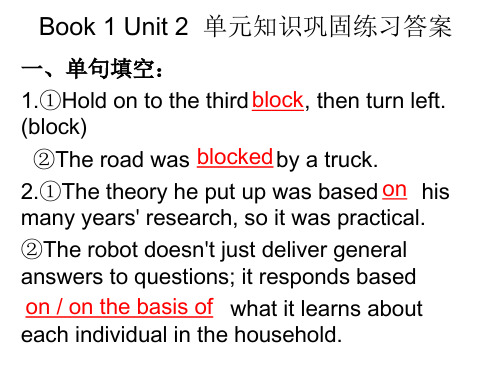
5. As is known to us, Tu Youyou is recognized as ________ a famous scientist in the medical field. 6. ①The puzzled expression ________ on her face suggested that she didn’t know how she could ________ expressher feelings properly. (express) oneself (one) well is ②Learning to express _________ an important part of education. 7. ① ________ the public’s request,the new At traffic regulation has been changed slightly.
_______________________________________ 3. 说实话,我不喜欢他对我说话的方式。
To be honest, I don’t like the way ( that / in which ) he speaks to me. _______________________________________
late ④The story happened in the_______ 19th century. ⑤He is never____ late for work. lately? ⑥What have you been doing___ ⑦People want to buy thelatest ___ newspaper, and nobody wants to buy yesterday’s.
unit2book1 词汇课后作业
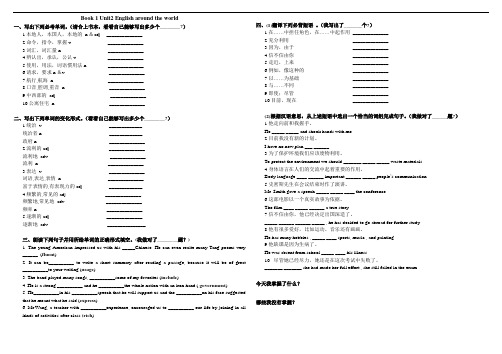
Book 1 Unit2 English around the world一、写出下列必考单词。
(请合上书本,看看自己能够写出多少个________?)1.本地人,本国人,本地的n.&adj. ______________2.命令,指令,掌握v. ______________3.词汇,词汇量n. ______________4.辨认出,承认,公认v. ______________5.使用,用法,词语惯用法n. ______________6.请求,要求n.&v. ______________7.航行,航海n. ______________8.口音,腔调,重音n. ______________9.中西部的adj. ______________10.公寓住宅n. ______________二、写出下列单词的变化形式。
(看看自己能够写出多少个________?)1.统治v. _____________统治者n. _____________政府n. ______________2.流利的adj. ______________流利地adv. ______________流利n. ______________3.表达v. ______________词语,表达,表情n. ______________富于表情的,有表现力的adj. _____________4.频繁的,常见的adj. ______________频繁地,常见地adv. ______________频率n. ______________5.逐渐的adj. ______________逐渐地adv. _______________三、朗读下列句子并用所给单词的正确形式填空。
(我做对了________题?)1. The young American impressed us with his _____Chinese. He can even recite many Tang poems very______. (fluent)2. It can be__________ to write a short summary after reading a passage, because it will be of great__________to your writing.(usage)3. The band played many songs, __________some of my favorites.(include)4. He is a strong __________ and he __________the whole nation with an iron hand.( government)5. He__________in his __________speech that he will support us and the __________on his face suggestedthat he meant what he said.(express)6. Mr.Wang, a teacher with __________experience, encouraged us to __________ our life by joining in allkinds of activities after class.(rich) 四、(1)翻译下列必背短语。
新视野大学英语视听说教程2第三版BOOK1 UNIT2
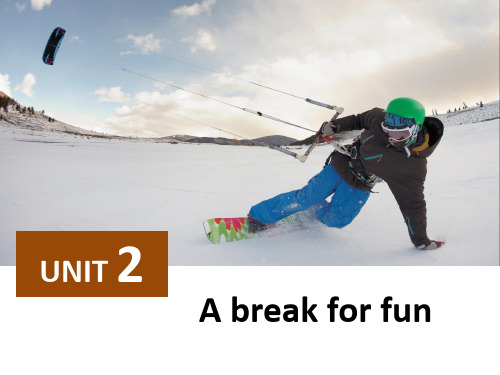
UNIT 2
A break for fun
Unit 2 A break for fun
Learning objectives Opening up
Listening to the world Speaking for communication Further practice in listening
Listening to the world
John Wayne
an American film actor, director and producer, and an Academy Award winner.
Additional Notes
Sweeney Todd
a horror musical film released in 2007. The film tells the tale of Sweeney Todd, an English barber and serial killer who murders his customers.
1) tall 2) masculine face /
3 Watch Part 2 and fill in the blanks.
1) romantic
A
2) great
B
3) recommend 4) action
5) collection
7) scenes
C
6) real life
D
8) fantastic
Listening to the world
8 My favorite subjects of photos are people / buildings / nature / __a_n_i_m__a_ls____.
Exercises for Unit2、音标认读(完全版)

Exercises for Unit2一、认真完成下面的单词和句子,注意书写。
例:一月 January Jan. 二月三月四月五月六月七月八月九月十月十一月十二月你什么时候起床?我六点半起床。
你的生日在什么时候?我的生日在六月。
二、选词填空。
(are, have, February, June, September, December, November, August,spring, summer, fall, winter)e spring, summer, fall and . In Beijing, it’s springfrom arch to ay. Summer is from to . Fall is from to. inter is from to the next year. Butin Sydney, it’s from September to November. So when it’swinter in Beijing,it’s in Sydney.三、完成下面的对话。
A: ?B: There are 4 seasons in a year.A: ?B: They are spring, summer, fall and winter.A: How many months(月) are there in a year?B: .A: hat are they?B: . A: How many months are there in a season?B: .A: ?B: y birthday is in ay.音标认读:一、元音前元音:[ i: ] [ i ] [ e ] [ æ ][ i: ]音标特征:前元音舌位高不圆唇长元音发音要诀:舌前部抬得最高,牙齿近乎全合。
舌尖抵下齿。
舌前部向硬颚尽量抬起,但比汉语普通话“i”音稍低, 没有摩擦。
嘴唇向两旁伸开,成扁平行. 做微笑状,发[ i: ]长音。
- 1、下载文档前请自行甄别文档内容的完整性,平台不提供额外的编辑、内容补充、找答案等附加服务。
- 2、"仅部分预览"的文档,不可在线预览部分如存在完整性等问题,可反馈申请退款(可完整预览的文档不适用该条件!)。
- 3、如文档侵犯您的权益,请联系客服反馈,我们会尽快为您处理(人工客服工作时间:9:00-18:30)。
Ⅰ.单词拼写
1.The achievements the city has achieved have been widely ________(认可)by the public.
2.The way he deals with everything efficiently is being accepted by his colleagues ________(逐渐地).
3.The ________(表情) on his face suggested that he was not satisfied with the result.
4.Go ________(直接地)ahead, and you can find the museum you are eager to visit in the city.
5.Because of modern technology, the ________(身份)of the suspected can be confirmed with merely a drop of blood.
6.________ (频繁的)natural disasters led to a great loss to the people in the area.
7.You'd better find a ________(本地人)to show you the way to the nearest hospital.
8.It is my last ________(请求). I shall never ask you anything again.
9.After a long march, the general ________(命令)that the army should have a break in the small village.
10.These women pilots' main task was to send soldiers and goods to those ________(基地)to make sure the war went smoothly.
答案
1.recognized 2.gradually 3.expression 4.straight
5.identity 6.Frequent7.native8.request
9.commanded10.bases
Ⅱ.用所给词的适当形式填空
1.He ________ (gradual) recovered from the injury.
2.There come two boys. The former is Tom; the ________ (late) is Bill.
3.How ________ (fluent) he speaks English!
4.________ (actual) he pretended to be ill.
5.We went to the town ________ (frequent), so we were familiar with it.
6.Judging from her happy ________ (express), she must have heard of the good news.
7.The small town has changed beyond ________ (recognize).
8.We didn't recognize the ________ (identify) of the dead man.
9.The ________ (develop) of English language is slow.
10.He comes from an ________ (Africa) country.
答案
1.gradually tter 3.fluently 4.Actually
5.frequently 6.expression7.recognition8.identity
9.development10.African
Ⅲ.单句语法填空
1.The reason ________ he changed his job was that the pay was too low.
2.________ (base) on his own experience, he wrote a novel.
3.The number of the students in our school ________ (be) five thousand, and a large number of them ________ (be) keen on sports.
4.Believe ________ or not, we haven't seen each other for twenty years.
5.At present, the farmers ________ (get) in their crops.
6.Because ________ the heavy fog, the flight was called off.
7.We should make good use ________ this chance.
8.Tom came up ________ a good idea that we would build a tree house.
9.She was expected ________ (deliver) a good speech.
10.They live in the same department ________ Mr. Green does.
答案与解析
1.why先行词为the reason,定语从句中缺状语,故用why 引导。
2.Based based on 以……为依据。
3.is; are the number of...作主语,谓语动词用单数形式;a large number of...作主语,谓语动词用复数形式。
4.it believe it or not 信不信由你。
5.are getting at present 与现在进行时连用。
6.of because of“由于”,后跟名词。
7.of make good use of 充分利用。
8.with come up with 提出,想出。
9.to deliver expect 后跟不定式作宾语。
10.as the same...as 与……相同。
Ⅳ.课文浓缩语法填空
The English spoken in England in the past was quite __1__ (differ) from the English spoken today.
Between about AD 800 and 1150, English became less like German. In the 1600's, Shakespeare made use __2__ a __3__ (wide) vocabulary than ever before.
In the 18th century, British people __4__ (bring) English to Australia, __5__ it was used by a larger population. From 1765 to 1947, English became the language for government and __6__ (educate) in India. __7__ present the number of the people using English __8__ (increase) rapidly.
In a word, English is __9__ (gradual) developing __10__ (base) on the pace of society.
答案
1.different 2.of 3.wider 4.brought 5.where
6.education7.At8.is increasing9.gradually
10.based。
